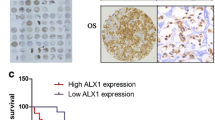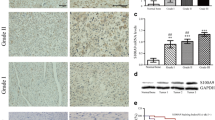Abstract
Background
Besides Mad2’s role in carcinogenesis, recent study has shown that it is essential in cell survival. Here we found that knockdown of Mad2 causes osteosarcoma cell death through apoptosis, with the apoptotic signal resulting from Rad21 cleavage.
Methods
U2OS and MG63 cells were divided into three groups: the Mad2 siRNA group, mock group and normal control group; the Mad2 siRNA group and mock group are transfected with Mad2 shRNA plasmid and mock plasmid, respectively. G418 was used to increase the transfection efficacy, which was evaluated by GFP fluorescence. Quantitative PCR and Western blotting analyses were used to detect the transcription and expression of Mad2, Rad21 and caspase-3, respectively. Flow cytometry assay using PE-labeled Annexin-V and PI, TUNEL assay and Hoechst 33258 staining were used to evaluate cell apoptosis.
Results
We successfully achieved knockdown of Mad2 expression in cancer cells using RNA interference. We observed obvious apoptosis in the Mad2 siRNA group compared with the Mock and control group. We found that the apoptosis induced by Mad2 knockdown correlated with Rad21 cleavage.
Conclusion
These results confirmed that knockdown of Mad2 causes osteosarcoma cell death through apoptosis and provides evidence that the apoptotic signal resulted from Rad21 cleavage. This study suggested that Mad2 has potential to be a novel target for cancer therapy.




Similar content being viewed by others
References
Kim HJ, Chalmers PN, Morris CD. Pediatric osteogenic sarcoma. Curr Opin Pediatr. 2010;22:61–6.
Bharadwaj R, Yu H. The spindle checkpoint, aneuploidy, and cancer. Oncogene. 2004;23:2016–27.
Bridge JA, Nelson M, McComb E, McGuire MH, Rosenthal H, Vergara G, Maale GE, Spanier S, Neff JR. Cytogenetic findings in 73 osteosarcoma specimens and a review of the literature. Cancer Genet Cytogenet. 1997;95:74–87.
Murata H, Kusuzaki K, Hirasawa Y, Ashihara T, Abe T, Inazawa J. Relationship between chromosomal aberrations by fluorescence in situ hybridization and DNA ploidy by cytofluorometry in osteosarcoma. Cancer Lett. 1999;139:221–6.
Bayani J, Zielenska M, Pandita A, Al-Romaih K, Karaskova J, Harrison K, Bridge JA, Sorensen P, Thorner P, Squire JA. Spectral karyotyping identifies recurrent complex rearrangements of chromosomes 8, 17, and 20 in osteosarcomas. Genes Chromosomes Cancer. 2003;36:7–16.
Imai Y, Shiratori Y, Kato N, Inoue T, Omata M. Mutational inactivation of mitotic checkpoint genes, hsMAD2 and hBUB1 is rare in sporadic digestive tract cancers. Jpn J Cancer Res. 1999;90:837–40.
Hernando E, Orlow I, Liberal V, Nohales G, Benezra R, Cordon-Cardo C. Molecular analyses of the mitotic checkpoint components hsMAD2, hBUB1 and hBUB3 in human cancer. Int J Cancer. 2001;95:223–7.
Ruddy DA, Gorbatcheva B, Yarbrough G, Schlegel R, Monahan JE. No somatic mutations detected in the Mad2 gene in 658 human tumors. Mutat Res. 2008;641:61–3.
Yu L, Guo WC, Zhao SH, Tang J, Chen JL. Mitotic arrest defective protein 2 expression abnormality and its clinicopathologic significance in human osteosarcoma. APMIS. 2010;118:222–9.
Kops GJ, Foltz DR, Cleveland DW. Lethality to human cancer cells through massive chromosome loss by inhibition of the mitotic checkpoint. Proc Natl Acad Sci USA. 2004;101:8699–704.
Michel L, Diaz-Rodriguez E, Narayan G, Hernando E, Murty VV, Benezra R. Complete loss of the tumor suppressor MAD2 causes premature cyclin B degradation and mitotic failure in human somatic cells. Proc Natl Acad Sci USA. 2004;101:4459–64.
Nasmyth K. Segregating sister genomes: the molecular biology of chromosome separation. Science. 2002;297:559–65.
Shi Q, Wang J, Shu CZ, Weng YG, Wang YX, Xu YJ, Jiang HY, Liu ZJ, Liu QS, Cai Y. Effect of RNA interference targeting MAD2 gene on cell proliferation. Chin J Anat. 2007;30:400–4.
Yang H, Ren Q, Zhang Z. Cleavage of Mcd1 by caspase-like protease Esp1 promotes apoptosis in budding yeast. Mol Biol Cell. 2008;19:2127–34.
Chen F, Kamradt M, Mulcahy M, Byun Y, Xu H, McKay MJ, Cryns VL. Caspase proteolysis of the cohesin component RAD21 promotes apoptosis. J Biol Chem. 2002;277:16775–81.
Pati D, Zhang N, Plon SE. Linking sister chromatid cohesion and apoptosis: role of Rad21. Mol Cell Biol. 2002;22:8267–77.
Wang X, Jin DY, Wong YC, Cheung AL, Chun AC, Lo AK. Correlation of defective mitotic checkpoint with aberrantly reduced expression of MAD2 protein in nasopharyngeal carcinoma cells. Carcinogenesis. 2000;21:2293–7.
Wang X, Jin DY, Ng RW, Feng H, Wong YC, Cheung AL, Tsao SW. Significance of MAD2 expression to mitotic checkpoint control in ovarian cancer cells. Cancer Res. 2002;62:1662–8.
Jeong SJ, Shin HJ, Kim SJ, Ha GH, Cho BI, Baek KH, Kim CM, Lee CW. Transcriptional abnormality of the hsMAD2 mitotic checkpoint gene is a potential link to hepatocellular carcinogenesis. Cancer Res. 2004;64:8666–73.
Michel LS, Liberal V, Chatterjee A, Kirchwegger R, Pasche B, Gerald W, Dobles M, Sorger PK, Murty VV, Benezra R. MAD2 haplo-insufficiency causes premature anaphase and chromosome instability in mammalian cells. Nature. 2001;409:355–9.
Wang L, Yin F, Du Y, Chen B, Liang S, Zhang Y, Du W, Wu K, Ding J, Fan D. Depression of MAD2 inhibits apoptosis and increases proliferation and multidrug resistance in gastric cancer cells by regulating the activation of phosphorylated survivin. Tumour Biol. 2010;31:225–32.
Tanaka K, Nishioka J, Kato K, Nakamura A, Mouri T, Miki C, Kusunoki M, Nobori T. Mitotic checkpoint protein hsMAD2 as a marker predicting liver metastasis of human gastric cancers. Jpn J Cancer Res. 2001;92:952–8.
Rimkus C, Friederichs J, Rosenberg R, Holzmann B, Siewert JR, Janssen KP. Expression of the mitotic checkpoint gene MAD2L2 has prognostic significance in colon cancer. Int J Cancer. 2007;120:207–11.
Zhang SH, Xu AM, Chen XF, Li DH, Sun MP, Wang YJ. Clinicopathologic significance of mitotic arrest defective protein 2 overexpression in hepatocellular carcinoma. Hum Pathol. 2008;39:1827–34.
Acknowledgments
We thank Dr. Zan Tong (Wuhan University, Wuhan, China) for her critical reading of this manuscript. This work was supported by a grant from the Natural Science Foundation of Hubei Province, China (no. 302-131702).
Conflict of interest
None of the authors of this manuscript have received any type of support, benefits or funding from any commercial party related directly or indirectly to the subject of this article.
Author information
Authors and Affiliations
Corresponding author
About this article
Cite this article
Yu, L., Guo, W., Zhao, S. et al. Knockdown of Mad2 induces osteosarcoma cell apoptosis-involved Rad21 cleavage. J Orthop Sci 16, 814–820 (2011). https://doi.org/10.1007/s00776-011-0156-x
Received:
Accepted:
Published:
Issue Date:
DOI: https://doi.org/10.1007/s00776-011-0156-x




